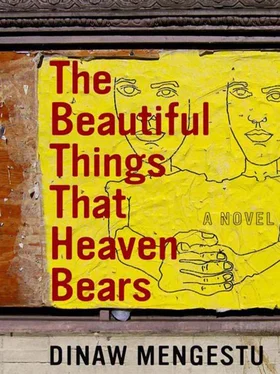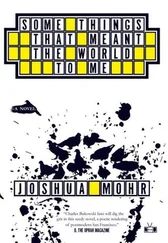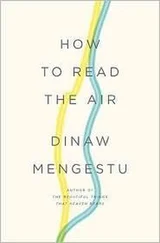I’ve never felt a disappointment so close to hatred again.
It takes my father at least ten minutes to stand. In what could pass for an act of mercy, the lead soldier tells his men to leave my father alone as he lurches his way off the ground. Of course, my father looks back one last time at my mother, brother, and me before he’s escorted at gunpoint out the door. I’m not even sure how much he was able to see at that point — whether our faces were distinguishable from one another, or if through the haze of tears and blood the three of us merged into one indeterminate figure. I like to think that’s the way he saw us, his family, not as individual people, but as a world, one that he could faithfully claim to have created. He couldn’t have seen Dawit’s face. It was buried entirely in my chest. Or my own, as most of it was hidden behind my mother’s back. All of that is irrelevant, though. He didn’t turn around so he could see us, but so that we could see him. He always believed in making a lasting impression.
The next day, at my mother’s insistence, I left home. I took nothing with me but a small red cloth sack stuffed with all of the gold and jewelry my parents owned. I pawned and traded each item in order to make my way south to Kenya. By the time I crossed the border, the only I item had left were my father’s cuff links.
The day after our evening tea session, Judith brought dinner to the store — a rosemary lamb roast with baby potatoes that we ate on paper plates with our hands, and a bottle of red wine that we drank out of six-ounce clear plastic cups. Looking back, it’s possible to parcel our relationship out into distinct phases, the last of which began with that dinner. We had fumbled our way around each other long enough, and that meal was, I know now, our last opportunity to get it right.
Judith came to the store early that morning with Naomi, and this time she was the one who asked me what my plans for dinner were later that evening.
“If you’re not doing anything,” she said, “I could make dinner and bring it to the store. It’ll be like a picnic, except of course it’s winter, and we won’t eat outside, but other than that…”
“I can’t imagine anything better,” I told her.
That was the only time either one of us spoke directly to the other about what we wanted. I almost regretted being so up front until I saw her smile at my response. There’s something physical that changes with a person’s appearance when they suddenly open up to you. For Judith, that change occurred almost exclusively in her eyes, which generally never rested for too long on any one person or object, unless it was Naomi. Now, though, she met my eyes with hers and did not back down.
I closed the store early for the third time so that we could eat our food before it got too cold. I pulled down the metal grate and turned the blinds and shut off the fluorescent lights. We used the lamp that I kept behind the counter and lit a row of tea candles that until then had been covered in dust. The light gave the store a warmth and glow that I had thought of as being reserved exclusively for homes.
We talked about Dostoyevsky and The Brothers Karamazov over dinner. Naomi and I spent a few minutes working out the pronunciation of the characters and author.
“Fee-a-door,” I told her. “Like Theodore.”
“Or fee at the door,” Naomi offered.
“Yes. As in, from now on you have to pay a fee at the door before you can come and read in my store.” Naomi shook her head and tried not to smile at my terrible joke, but I stared at her with my arms open until finally she relented and laughed even as she continued to shake her head.
“He was in jail once, wasn’t he?” Judith asked me.
“Briefly,” I told her. “After he was arrested he was carried into the city square, where he was supposed to be executed. They had the nooses all set, and it wasn’t until the last moment that it was revealed to be a hoax. He spent four years in jail after that.”
Naomi had a hard time understanding that story. She asked us why the government would do that to someone. Judith tried to explain to her that governments were no different from people, and that what they wanted, more than anything else, was to protect themselves. “Dostoyevsky,” she said, “was a threat to them, and they wanted to get rid of him without having to kill him.” Naomi couldn’t understand that either, though, how one man could threaten an entire government just by writing.
“Maybe he couldn’t,” I told Naomi. “But somebody out there could, and until you know who it is, it’s better just to scare everyone.”
Our answers still weren’t enough. There was a logical “why?” that could be attached to every response we came up with, and it seemed too harsh to say that terrible things happen to people for no reason other than they have to happen to someone. Finally Judith gave in and admitted what we had both been thinking.
“I don’t ultimately know why,” she said. “It’s just one of those things about life.”
Naomi accepted this answer, I suspect in part because she had heard it before. There was enough resignation in Judith’s voice and enough resilience and determination in her daughter’s to arrive at the truth, to make it clear that they had had conversations that ended like this one before.
After dinner we drove to the Mall in Judith’s car to see the National Christmas Tree. It was Judith’s idea. She said she wanted to see something that reminded her that Christmas was just a little more than a week away. There were hundreds of spectators surrounding the tree when we arrived, as if they were all expecting it to do something more than just stand there and twinkle in the darkness. I lifted Naomi into the air a few times so she could get a better view. Judith slipped her arm into the crook of my elbow and the three of us circled the tree once, and then twice.
When we returned home from the Mall, Judith invited me in for one last cup of tea. Naomi still had at least another hour before she had to go to bed and so she tugged on my arm and said in her high-pitched, pleading voice, “You have to come and see our tree.”
Judith had gone out of her way to create an elaborate Christmas pageantry in their living room for her daughter. The dining-room table had been pushed to the side to make way for a seven-foot tree that glittered obscenely in white lights. Two stockings with embroidered names were nailed to the mantel. More lights framed the back window, and stacked under the tree were three enormous boxes. Each was elegantly wrapped in green, white, and red, with a huge red bow tied to the top.
“Those are all from Naomi’s dad,” Judith said, pointing toward the boxes. “He likes his presents to be…ostentatious.”
I stared at the boxes and tried to guess their contents. It was obvious just from looking at them that whoever Naomi’s father may have been, and regardless of how far away he may have lived, he had me beat.
“And what about you?” I asked Judith. “What do you like?”
“I prefer simple and elegant.”
“I like small and cheap,” I said.
“That’s too bad,” Judith said. “It looks like you’ve gone and picked the wrong family.”
She said it without thinking, which I suppose was precisely what made it even worse. As soon as she said it she caught the look on my face and tried to take it back.
“Why did you say that?” I asked her.
“It was a joke,” she said. “You know what I mean.”
And I believed her; it had been a joke, but whether or not she meant it with the lightest intentions didn’t matter. I could see myself trying to measure up at family dinners and cocktail parties, and as a result, always falling short. How many times would I have to stare into a mirror and compare myself against Judith? I could go on second-guessing myself forever, and perhaps even find some consolation to the routine, but I saw now that all it would take was one fleeting moment of skepticism on her end to confirm all of my inadequacies, validate all of my doubts, and send me running back to the corner I came from. Our insecurities run far too deep and wide to be easily dismissed, and Judith, without knowing it, had hit that central nerve whose existence I was reluctant to admit, but that when tapped, sent a sudden shock of shame and humiliation beneath which everything else crumbled.
Читать дальше











